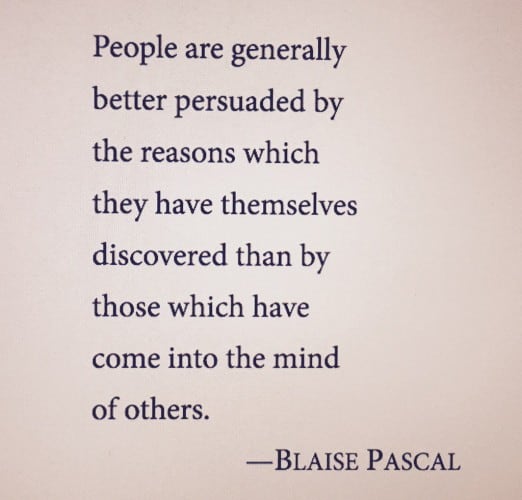As I've worked with hospital and healthcare people over the past ten years, one personal benefit to me has been exposure to new ideas and new influences. As an engineer with an MBA, my reading and learning tended to focus on books about Lean, systems thinking, and leadership (see my book recommendations here, even if the list might be a bit out of date… there are some classics there).
I've been exposed to ideas from the social sciences, ideas that have been thought provoking and helpful. I find it interesting that some of my favorite Lean authors, such as Jeffrey Liker (PhD in sociology) and David Mann (PhD in psychology), come from social science backgrounds instead of engineering. I mean no disrespect to engineers of course… I'm just saying we benefit from a diversity of perspectives in the Lean world, and that includes the perspectives of nurses and others who work in this field.
I've said many times, only half jokingly, that if I were to ever get another formal degree, that it would be in counseling or family therapy, even if I didn't go to work in that field.
Family Systems Theory
A few years back, a lab director at a hospital (who had retired from a career in military medicine, another diverse background) introduced me to the idea of “family systems theory.” Even with the word “family” in there, some concepts were very applicable to the workplace. This included “triangles” (encouraging people to deal directly with each other instead of bringing a third party into the conflict).
Another helpful concept is the idea of “overfunctioning and underfunctioning,” where a manager might give answers to their employees (overfunctioning) which only reinforces to the employees that they need to just be quiet and follow orders (underfunctioning) and this leads to a downward spiral of one behavior reinforcing the other over time. Telling people what to do might seem efficient in the short-term, but it really undercuts people's ability to improve in the long-term.
Proper Kaizen coaching helps break those cycles, as managers step back from giving answers and ask employees to speak up and try out ideas themselves — it's a tough cycle to break, isn't it?
Hear Mark read this post — subscribe to Lean Blog Audio
Motivational Interviewing
When I was at the recent Lean Startup Conference, somebody I know somewhat randomly introduced me to another attendee. As we chatted, I learned her background was social work and she was founder of a technology startup that solves a problem that was important to her and her work. I never met people like that when I worked in manufacturing… again, I've really grown to appreciate the perspectives and experiences of those who have different educational backgrounds than my own.
We were talking about healthcare, continuous improvement, and such topics and she suggested that I look into a framework called “motivational interviewing” (MI) as something that might be helpful in my Lean coaching.
I took her recommendation and, by the time I was on my flight home (hooray Kindle!), I was reading a free sample of the seminal book on this approach, Motivational Interviewing: Helping People Change, 3rd Edition.
The book gives a layman's definition of MI as:
“Motivational interviewing is a collaborative conversation style for strengthening a person's own motivation and commitment to change.”
I was instantly hooked. I try to help people change in a number ways (through this blog, my books, my work, etc). While MI was developed as a more effective way to help people with addictions, I think this really applies in the workplace. People might be “addicted” to old management behaviors… or they might have a real “ambivalence” to change. They can see reasons to change (why they should adopt Lean practices) but they also talk themselves out of it (they might be afraid or there are some personal positives that come from the old approach they are sticking to).
“Ambivalence is simultaneously wanting and not wanting something, or wanting both of two incompatible things.”
Miller, William R.; Rollnick, Stephen (2012-11-11). Motivational Interviewing, Third Edition: Helping People Change (Applications of Motivational Interviewing) (Kindle Locations 254-255). Guilford Publications. Kindle Edition.
I'll write more about MI, but a number of things jumped out at me from the book in the first few sample chapters.
MI recommends a style called “guiding.” Being “directive” doesn't work, in therapy or in our Lean efforts. When being directive, we fall into the “expert trap” and our “righting reflex” kicks in. Instead of being helpful, that causes defensiveness and other barriers to change.

The “righting refex,” as the book points out is usually well intended. We want to help others and we feel like we're helping them by giving them answers or telling them what to do.
MI is about helping people articulate their need for change and to discover their own path.
This next bit will remind you of the Toyota Kata approach, I think:
“The path out of ambivalence is to choose a direction and follow it, to keep moving in the chosen direction.”
I guess Toyota Kata would also include a series of experiments or tests of change that would move us in that direction. A therapist can't give an addict a specific playbook of steps and answers any more than a TK coach could, right?
Co-author Rollnick wrote:
“I realized with some shock that the personal and professional inclination to blame, judge, and label others for being “resistant” and “not motivated” was not confined to the addiction field. It popped up in just about every care setting I came across. MI provided a different way of approaching these conversations about change.”
So, when a coach tries to tell people what to do (I've been guilty of this, believe me), we breed “resistance:”
“Argue for one side and the ambivalent person is likely to take up and defend the opposite. This sometimes gets labeled as “denial” or “resistance” or “being oppositional,” but there is nothing pathological about such responses. It is the normal nature of ambivalence and debate.”
This sort of resistance is NORMAL. That's a big insight for me. Telling people what to do leads to the coachee feeling “angry, defensive, uncomfortable, powerless.” Shaming people about their bad behavior doesn't lead to personal change either, a key lesson I need to keep in mind.
I'll share one last quote from the book, that I had previously tweeted as a screenshot from the book:

Powerful stuff. There's more to Motivational Interviewing than merely “leading by asking questions.”
I'll share more from the book and more reflections over time.
Please scroll down (or click) to post a comment. Connect with me on LinkedIn.
Let’s build a culture of continuous improvement and psychological safety—together. If you're a leader aiming for lasting change (not just more projects), I help organizations:
- Engage people at all levels in sustainable improvement
- Shift from fear of mistakes to learning from them
- Apply Lean thinking in practical, people-centered ways
Interested in coaching or a keynote talk? Let’s talk.
Join me for a Lean Healthcare Accelerator Trip to Japan! Learn More










Another tactic is to change the conditions which can lead people to change behavior. Often our organizations have toxic conditions that push people to take actions we would like to see change. If people are hiding information and refusing to cooperate it is usually a sign of a dysfunctional system more than dysfunctional people. Focusing on changing the people is not effective in such a case (even using good tactics).
I recently wrote about a similar area – Change Management: Create a Culture Seeking Continual Improvement or Use Band-Aids?
http://management.curiouscatblog.net/2015/11/17/change-management-culture-fit-or-band-aids/
Thanks for the comment and link. I’ve never thought it was fair or effective to blame people for being “resistant to change.”
We need to focus on changing the environment and the culture.
I think this Motivational Interviewing approach would be an interesting way to structure a conversation with an executive who is ambivalent about change… getting them to articulate the case for change and get them to progress toward taking action instead of just making excuses for the status quo.
A little back and forth on Twitter with Paul Critchley:
Here is the problem then: Most mass deployments of Lean are all about directing change in the work with the promise of changes in behaviors and culture. I think there are plenty of examples in manufacturing (Danaher) where this is true but not so much in healthcare.
What mass deployments of Lean in healthcare have been effective at changing behaviors and culture? If not, what are the other options? Level by level learning and coaching?
Interesting post. I’m a clinical social worker who transitioned into lean several years ago. I found an affinity between lean and the social work concept of ‘person in environment’. Basically, this means that an individual’s distress, mental illness etc exists within the context of their family, friends, culture and the like. I think this applies to organizations also.
Mark – Great post! And as an engineer, no disrespect taken! I remember taking SOC 101 and Psych 101 more years ago than I can remember and wondering “Where will I ever need to know this stuff?” Now that I am trying to apply Lean in a government setting I am wishing I had a deeper knowledge of both and would love to get into the OD (Org Development) field.
Looking forward to future posts about MI!
Definitely true true true! We have to be willing to guide, and allow others to pave their own path. I love that you’re broadening your perspectives and delving into other areas! Proves we are never done learning!
Reminds me of an Elizabeth Barrett Browning poem where she writes: “You can’t change someone’s mind against their will”.
Several years back our company embarked on an initiative and I had confided with one colleague that I was pretty sure we’d find that doesn’t work and abandon it 3-5 years down the road, but I didn’t want to publicize that. 3 years later, after an ops manager was lamenting all the various issues the initiative had created, I admitted that I had suspected as much would happen back when we started. The manager immediately said “Why didn’t you anything! You could have saved us all this trouble!”. I replied, ” I was new, how much stock would you have put in my opinion? Should we have argued over it? Why should I be so arrogant to believe only my hypothesis was right? besides, it was a chance for the organization to learn something, and that momentum will outlive my opinion”.
I was really surprised that this video on healthcare quality improvement (about PDSA, etc) talks about Motivational Interviewing about 7:22 in:
“Resistance to change can be an opportunity in QI”
Here is the first workshop I’ve seen out there about Lean and MI, taught by a former Toyota guy, Ron Oslin:
http://www.mwcmc.org/event-2158773
It’s in Baltimore, May 18.
[…] Back in December, I wrote about a method called “Motivational Interviewing” (MI), something I learned about from a social worker who was also at the Lean Startup Conference. It’s funny how these worlds intersect sometimes. […]
Comments are closed.